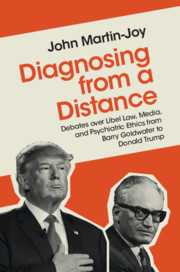 Diagnosing from a Distance
Diagnosing from a Distance Published online by Cambridge University Press: 29 February 2020
This is the first book to explore an ethical dilemma that psychiatrists increasingly face in the age of Donald Trump: is it ethical to comment on the mental health of public figures? Psychiatrists may intervene when a patient is unsafe, but what is their role when a politician appears ill and is a risk to the country? The APA’s Goldwater Rule declares that when a psychiatrist is asked for an opinion on a public figure, it is unethical to comment – yet controversy rages on the issue. Diagnosing from a Distance probes the dramatic history and complex ethics of the issue. With accessible style yet scholarly substance, this book begins with Adolf Hitler; traces the debate over Barry Goldwater, including Goldwater’s libel suit against Fact magazine; explores the rise of professionalism in the formation of the Goldwater Rule; documents errant CIA profiling during the Nixon years; and examines the controversy over President Trump. In light of this history, this book proposes a humane alternative to the Goldwater Rule. Based on original interviews and archival sources, Diagnosing from a Distance will change the way you think about the First Amendment, the media, and psychiatric ethics.
To save this book to your Kindle, first ensure no-reply@cambridge.org is added to your Approved Personal Document E-mail List under your Personal Document Settings on the Manage Your Content and Devices page of your Amazon account. Then enter the ‘name’ part of your Kindle email address below. Find out more about saving to your Kindle.
Note you can select to save to either the @free.kindle.com or @kindle.com variations. ‘@free.kindle.com’ emails are free but can only be saved to your device when it is connected to wi-fi. ‘@kindle.com’ emails can be delivered even when you are not connected to wi-fi, but note that service fees apply.
Find out more about the Kindle Personal Document Service.
To save content items to your account, please confirm that you agree to abide by our usage policies. If this is the first time you use this feature, you will be asked to authorise Cambridge Core to connect with your account. Find out more about saving content to Dropbox.
To save content items to your account, please confirm that you agree to abide by our usage policies. If this is the first time you use this feature, you will be asked to authorise Cambridge Core to connect with your account. Find out more about saving content to Google Drive.